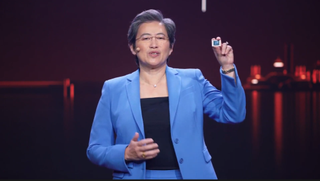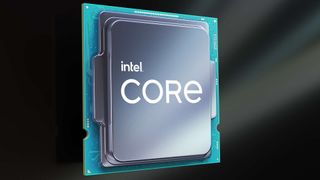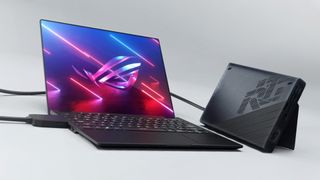The 7 announcements from CES 2021 that every PC gamer should know about
Come one, come all, to a beautiful show!

CES 2021 is all but officially wrapped up for this year, but over these past few days it's offered us our first glimpse of what's in store for the year ahead. From the big names in PC gaming to true-to-Cyberpunk RGB facemasks, we've not been disappointed with the product announcements and prototypes out of the show, despite this year marking the show's maiden digital outing.
CES happens in the blink of an eye, too. On Monday, Intel took to the stage with its new announcements, including its upcoming Intel Rocket Lake CPUs. Following that, on Tuesday, AMD and Nvidia hit the live stream circuit with a host of reveals, including AMD's Ryzen 5000 mobile chips and Nvidia's RTX 30-series mobile GPUs.
It's been easier than ever to miss out on the major announcements with so many live streams and press releases whizzing by. But don't worry, if you feel like the tech show has passed you by, you've come to the right place. Here's your lot—the best tech out of CES 2021.

AMD Ryzen 5000 mobile processors
AMD is taking its highly-successful Zen 3 architecture on the road with the upcoming Ryzen 5000 mobile processors. Ranging from four-core to eight-core chips and spanning the low-power U-series and high-performance H-series, AMD's also introducing something special for gamers in the HX-series.
There are two HX-series chips to look out for: the Ryzen 9 5980HX and Ryzen 9 5900HX. Equipped with eight cores and 16 threads, these chips are capable of 4.8GHz and 4.6GHz clock speeds, respectively. That nets you a chip that AMD says will let any high-end GPU fly in the latest games.
Intel has some stiff competition in the mobile space in 2021, it seems, especially ahead of its H-series Tiger Lake chips later this year. The first laptops featuring AMD's latest processors will start arriving in February.

Intel Rocket Lake
With a 19 percent IPC boost courtesy of the new Cypress Cove core, Intel's Rocket Lake chips are the biggest shake up to Intel's desktop CPU DNA in half a decade. They're built using the CPU smarts from 10th Gen Ice Lake mobile processors and the Xe graphics silicon from 11th Gen Tiger Lake chips, coming together to form a 14nm amalgam of the two 10nm parts.
The biggest gaming news, reviews and hardware deals
Keep up to date with the most important stories and the best deals, as picked by the PC Gamer team.
Rocket Lake is set to deliver improved single-threaded core performance over its predecessors, and perhaps even enough to draw ahead of AMD's Zen 3 architecture by a hair. However, it will be forced to concede in multithreaded performance, as even the top chip, the Core i9 11900K, will arrive with two fewer cores than its predecessor at eight cores and 16 threads. That's half the count of AMD's 16-core Ryzen 9 5950X.
Intel Rocket Lake is said to arrive by March, and in the meantime heaps of compatible Z590 motherboards have already arrived.





Razer Project Hazel
Razer is on a constant quest to out-do itself when it comes to prototypes and weird new partnerships. This year, a sign of the times we live in, Razer's turned its attention to the wearable of the moment: the face mask.
Project Hazel is an N95-grade respirator, which Razer is naming the "world's smartest mask".
With a see-through design, the mask is great around those that rely on lip-reading in their daily lives. It also comes with a built-in voice amp to alleviate muffled speaking and comes with RGB LEDs just because. The filters are replaceable and the ventilators rechargeable—Razer's seemingly covered every possible feature you could imagine out of a mask in 2077—sorry, 2021.
There's no release date for the Project Hazel just yet, but Razer assures us it's coming.
Nvidia RTX 30-series gaming laptops
It's no good having simply the fastest mobile CPU in your gaming laptop, you've got to pair it with some serious graphics silicon. Perfect timing then, since Nvidia just announced its line-up of RTX 30-series mobile GPUs.
There are three new GPUs to be on the lookout for: the RTX 3080, RTX 3070, and RTX 3060. Nvidia is calling this the biggest gaming laptop launch ever, too, with over 70 new gaming laptops being released in the coming months featuring the latest chips. Some as early as January 26.
The top chip, the RTX 3080, will be available with up to 16GB of GDDR6 memory onboard.
With powerful new CPUs and GPUs in place, there's some wiggle room for even greater refresh rates and resolutions, too. Multiple laptop manufacturers are delivering 240Hz, 1440p panels with the coming wave of notebooks, including some shiny new Razer Blades.
Nvidia RTX 3060 12GB graphics card
Nvidia's latest desktop creation is the RTX 3060. This graphics card lowers the cost of entry to the Ampere generation to $329, notable cheaper than the $399 RTX 3060 Ti yet surprisingly coming with more memory. 12GB of GDDR6, in fact.
We're keen to see cheaper options in the entry-level market right now, and in that regard, the RTX 3060 sure seems like a great fit. However, there is some trepidation from the team as to how great a leap this card will be over the RTX 2060, and even more so the RTX 2060 Super. Whereas other RTX 30-series cards give their predecessors a good kicking, the basic confirmed specs for the RTX 3060 indicate a perhaps smaller leap between Ampere and Turing at the RTX 3060's pay grade.
We'll have to see how this one plays out closer to launch. That's not long to wait, though, the RTX 3060 12GB is arriving late-February.

Asus ROG Flow X13 gaming laptop
Described as "easily the most exciting thing I've seen from CES 2021" by our own Alan Dexter, the Asus ROG Flow X13 is also widely exciting for the future of laptops on the whole.
The ROG machine is tiny, for one. Just a 13-inch design, this diminutive laptop is also one of those 2-in-1 ilk, the kind that flips all the way into tablet mode. As an owner of a 2-in-1, I can report that I, at least, never ever ever use the tablet mode. Or in fact the laptop in anything other than vanilla laptop mode.
My excitement for the Flow X13, as I'm sure shared by most, is not its AMD Ryzen 5980XS (low-power variant of the HX) chip or Nvidia GTX 1650 graphics, but that the ROG Flow X13 supports its very own external GPU. It's said that it shouldn't suffer from any external bandwidth issues, either, thanks to the use of a proprietary and awfully wide interface capable of 63 Gbps bandwidth. That's greater than even Thunderbolt 4, but arguably it does take up considerably more room than a Type-C port.
As someone that would love to do away with the clutter and have one device for every occasion, I have to say a compact laptop that can hook up to an eGPU and external monitor is something of a dream scenario. Here's hoping this one lives up to the CES buzz.

LG 42-inch OLED panel
CES is nothing if not a place for monitor announcements. This year we've seen a generous helping of genuinely exciting monitors and faster, bigger panels, including some 144Hz 4K and glorious 240Hz QHD fare. All of which sounds delightfully alluring to us PC gaming lot.
But if you've ever experienced a stunning OLED, you'll know why we're hankering to get hold of one on our desktops. Up until now, it's been gigantic TVs or nothing in the OLED game, but LG's just gone and announced a lineup of OLED panels that scale down to 42-inch.
That would still make for a notably large gaming monitor, even at a 4K resolution, but it's at least a promising sign that soon you could hook up your PC to a well-featured TV and get gaming with little delay. With growing support for VRR, quicker response times, and HDMI 2.1 on TVs, the thought of PC gaming on a TV might not be as abhorrent an idea as we've come to assume in the near-future.
Not the least bit for a chance to game at 4K on a stunning OLED.

Jacob earned his first byline writing for his own tech blog. From there, he graduated to professionally breaking things as hardware writer at PCGamesN, and would go on to run the team as hardware editor. He joined PC Gamer's top staff as senior hardware editor before becoming managing editor of the hardware team, and you'll now find him reporting on the latest developments in the technology and gaming industries and testing the newest PC components.
Most Popular


